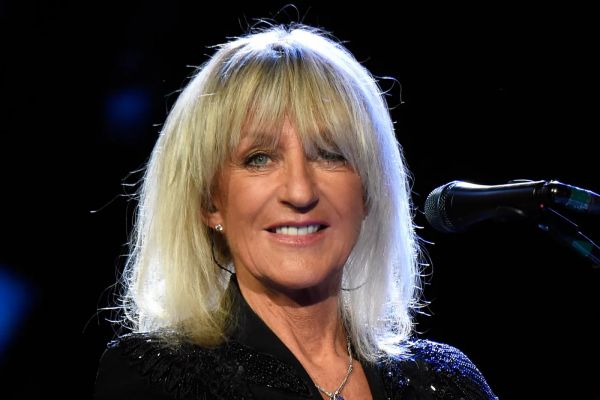One of the most influential members of the complex ensemble of individuals that comprised one of the greatest bands ever was Christine McVie, who passed away at the age of 79.
The remaining members of Fleetwood Mac relocated to a country house in 1970 to try to find a new direction as the band’s influence as a blues-rock group was waning. Their leader Peter Green had left after an LSD-induced decline.
Since she would hardly see her husband, Fleetwood Mac bassist John McVie, if they were in separate bands, Christine McVie had already given up her career as a singer and keyboardist.
However, she later said that just a few days before they were scheduled to go on a US tour, Fleetwood Mac “suddenly felt they needed another instrument to flesh out the sound.”
And there I was, doing practically nothing while knowing every song by heart because I had been watching them practice for the previous three months.
As they were “going out the door,” according to the band’s drummer Mick Fleetwood, she was asked to join the tour.
When they inquired,
“I didn’t hesitate,” she replied. I simply replied, “Yes, please.”
That marked the beginning of Christine McVie’s official involvement with Fleetwood Mac as well as the new turn the band was striving for.
They were set up for era-defining, stadium-filling success by the addition of McVie’s soulful vocals, her keyboard, and piano skills, and her talent for writing timeless pop songs – albeit through legendarily messy personal relationships and excessive drinking and drug use.
Christine Perfect was born in Cumbria in 1943, the daughter of a psychic healer and a concert violinist.
She attended an art college as the 1960s got underway, started playing in bands, and finally joined the blues band Chicken Shack. The more subdued songs she fronted ended up being the most commercially successful, even if her style never quite matched the group’s more boisterous sound.
Melody Maker readers named her the greatest female vocalist in 1969 and 1970 after her cover of Etta James”’ I’d Rather Go Blind reached the top 20. She also put out a solo CD, but she couldn’t handle being a solo performer.
In the meantime, Perfect fell in love with John McVie after Chicken Shack supported Fleetwood Mac on tour, and the two were wed in 1968. She announced that she was going to retire and stay at home.
That is until she accepted a tour invitation from Fleetwood Mac and was made a full member. Fleetwood supported her songwriting, and as the band underwent more line-up changes and released several albums, the majority of which failed to chart, her pop-friendly sound gradually grew in prominence.
In 1974, they moved to Los Angeles to start over there for a short while. Lindsey Buckingham, a singer, and guitarist from the US was invited to perform with the group. He agreed, but only if Stevie Nicks could come along too. There was the original Fleetwood Mac lineup.
According to Christine McVie,
“I believe that I improved. I became fixated on writing. I simply felt that I wanted to honor these two outstanding musicians.”
The trio’s tracks on their 1975 self-titled album, which reached number one in the US, were all excellent complements to one another.
Then came Rumours in 1977, which marked their artistic and commercial apex. We just knew we had something special on our hands when Rumours happened, according to McVie.
The majority of the songs on the album were strong enough to stand out as the best on any other LP. Don’t Stop, Songbird, and You Make Loving Fun are just a few of McVie’s songs that display her talent for writing exquisite choruses and lyrics that are deceptively straightforward but always sincere.
Few people could have written lyrics as obnoxiously sentimental as “I love you, I love you, I love you like never before” and made them sound as sincere as she did on Songbird.
But she never wrote songs that were so obvious as to be cliché. The challenge of crafting a love song, she explained. “I love you, you love me, where are you, I miss you, but you can’t just say that. There must always be a small twist.”
She claimed that Songbird visited her in the middle of the night for about 30 minutes.
“The music was literally in my head when I woke up in the middle of the night, but I had nothing with which to record it. I had a piano, but I didn’t have a tape recorder or any other way to record it.
“So that I wouldn’t forget it, I had to stay up all night playing it over. Then, at nine, I called the studio and told them I had to come in and put this on a two-track.”
She acknowledged that using alcohol and drugs contributed to her sleep issues. “Without a few toots of cocaine and a half-bottle of champagne, I’m not sure if I would have written Songbird. Or composed any of the songs found on that album, as I believe we were all quite inebriated.”
Rumors were composed and recorded with “white powder peeling off the wall in every area of the studio,” according to Fleetwood’s memoirs.
When it came to drugs, McVie asserted that she “was probably the most restrained of the lot.”
Personal conflicts fueled their songwriting as well, but they made band dynamics dangerous. While Buckingham and Nicks were going through a difficult breakup, she began a relationship with their lighting director while also divorcing John.
remarked Christine McVie: “Stevie and I got along with everyone except John, and Stevie got along with Lindsey. Mick was also going through his divorce at the time.
Some of us got along well in groups, but it could be challenging if the wrong people were all there in the same space.
She discussed the following with a different interviewer: “We occasionally got into arguments. However, neither the music nor the energy on stage could be compared.”
It was expected that the band would have difficulty following Rumours. Commercially successful albums include 1979’s Tusk and 1987’s Tango in the Night, the latter of which featured the hits Everywhere and Little Lies by John McVie.
Early in the 1990s saw the group reunite, but in 1998 McVie decided to leave, retreating to England. Because of her crippling fear of flying and her agoraphobia, she no longer wanted to go on tour. She was “frightened to even leave my doorstep.”
“I was alone and residing in this sizable space. I suppose I just became really solitary. When I started drinking too much, everything went from bad to worse.”
After spending 15 years in a state of semi-hibernation, she visited Fleetwood in Hawaii after overcoming her fear of flying with the aid of a therapist. As a result, she and the rest of the bandmates got back together, and to the delight of the fans, the original lineup resumed touring in 2014.
Their most recent tour, which featured Neil Finn of Crowded House instead of Buckingham, finished in November 2019.
McVie delighted in reuniting with the group whose legend-making work she had a hand in. She said, “I know now where I belong. It took me 15 years away from them before I realized it.
Also Read: How Does Katie George, An ESPN Sporyscaster, Get Paid?




